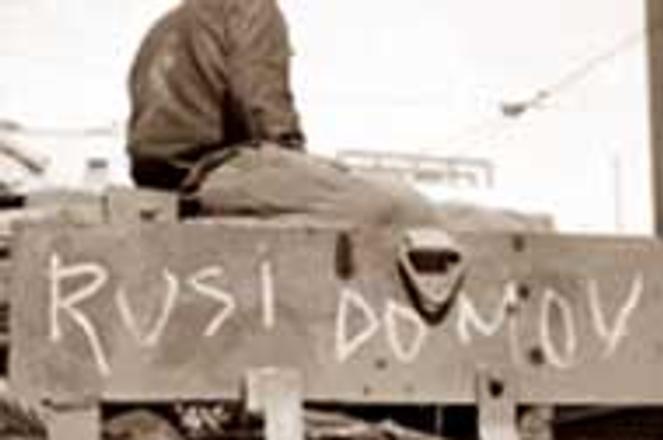August 21, 1968, Bratislava's SNP námestie. "Russians go home - Rusi Domov."
For those who lived west of the Iron Curtain, understanding Slovakia's apparent reluctance to now actively pursue the criminal prosecution of the former communist leaders can be difficult. Men such as Vasil Biľak symbolise an era marked by state oppression and disregard for human rights such as religious freedom and free speech.
The horrific photographs of the Warsaw Pact troops trouncing innocent civilians in the Prague Spring demonstrations in Prague and Bratislava; the stark image of the hammer and sickle flying atop flag poles in countries that clearly did not invite Soviet rule; the rapturous celebrations of the liberated Eastern Block citizens after the fall of the wall in 1989: all serve to stoke the fire of vindication in the principles of democracy and freedom.
Indeed, understanding Slovakia's reluctance can be difficult. However, communism was simply not entirely bad for the Slovak Republic. Before World War II, up to 90% of the population lived off the land, but communism industrialised and modernised the country. In Slovakia alone, from 1948 to 1989 industrial production increased 3,251%, while agricultural market production increased by 548%. Also the education level of the population increased substantially. All this gave Slovaks a living standard they never would have attained as an agrarian state.
Furthermore, many Slovaks reminisce that under communism everyone had a job, a litre of milk cost one crown, and all public services such as pensions and health care were covered by the state.
If Slovaks don't feel the need to hunt down every criminal from the communists era, to expose every shady character from their Soviet past, so be it. Let the country focus on modern-day problems and allow the majority of the past to be buried and forgotten - but first... get Biľak.
Biľak was no saint. He hand-delivered a letter to Leonid Brezhnev inviting Warsaw Pact troops to invade Czecho-Slovakia to squash the Prague Spring movement of 1968. He was also the leading ideologist of the Communist party in Czecho-Slovakia from 1968-1987. For many Slovaks he represents the imposing neo-Stalinist regime that ruined the country under "normalisation."
The wounds of the communist era persist and must somehow be addressed. Slovakia must vindicate the memories of the countless people whose land and property were confiscated by the Communists after World War II, the 28,000 'politically unreliable' citizens sent to work in forced labour camps, the 6,900 people deported to Russia from 1945 to 1953, and the 300 would-be escapees shot dead attempting to swim the Danube in search of freedom in the West.
These wounds can not be healed if Vasil Biľak is not punished for his crimes. The leaders of any state - be it communist, democratic or dictatorial - should hold the well-being of their people above everything else. Biľak failed in this sense and innocent Slovaks died for it.
Levying justice on a man who invited tanks to trample his own people should be actively pursued in the name of those countless thousands who suffered at the hands of the communists. Throwing the book at Biľak would allow the country to move on and face the problems of modern Slovakia, which are significant: thuggish skinheads, mobsters so fearless of today's police that they knock off their enemies by hacking them to pieces with a machete in public restaurants, and the leaders of modern Slovakia, self-serving political ranks rife with corruption.
The spectres of the past will never entirely go away, but by putting Biľak in jail, Slovakia can finally start focusing on sending modern criminals to accompany him.


